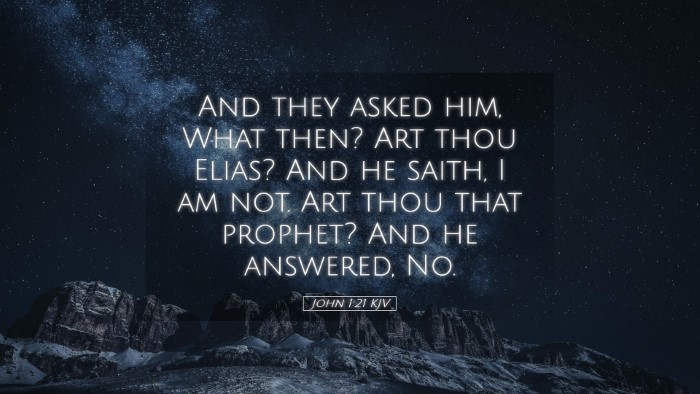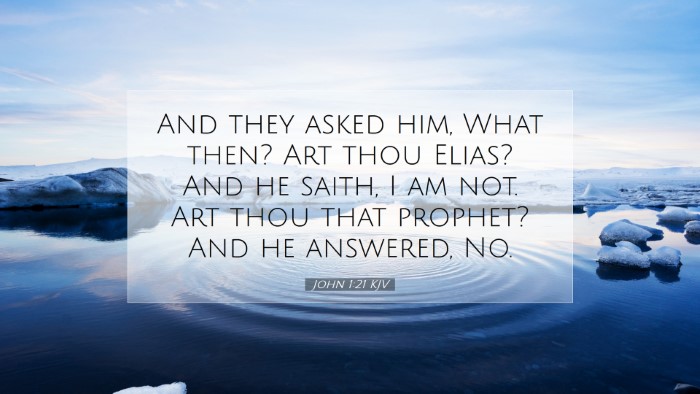Commentary on John 1:21
Verse: John 1:21 - "And they asked him, What then? Art thou Elias? And he saith, I am not. Art thou that prophet? And he answered, No."
Introduction
This verse is part of the narrative where John the Baptist clarifies his identity in response to questioning by the priests and Levites. His answers highlight both humility and the nature of his mission as the forerunner to Christ. This commentary combines insights from public domain sources such as Matthew Henry, Albert Barnes, and Adam Clarke.
Contextual Background
The early chapters of John introduce the ministry of John the Baptist who was sent to prepare the way for the coming Messiah. His ministry is rooted in the prophetic tradition, which the Jews expected to continue. The inquiry of the religious leaders indicates their concern for fulfilling prophecy and understanding John's role within it.
Insights from Commentary
-
Matthew Henry's Insights
Henry discusses the significance of John's denial of being Elijah. He argues that although John came in the spirit and power of Elijah, his mission was distinct. John’s role does not replicate actual prophetic figures but embodies their essence to prepare hearts for Christ. Henry emphasizes the importance of recognizing our mission while placing all glory on Christ alone.
-
Albert Barnes' Insights
Barnes elaborates on the misunderstanding of the people regarding John’s identity. He notes that the Jews expected Elijah to return before the coming of the Messiah, referencing Malachi 4:5. Barnes points out that John's refusal to claim this identity reflects his purpose of pointing others towards Christ instead of seeking personal recognition. His 'No' is a pivotal moment showing that he is not the fulfillment of all prophecies but rather one who prepares the way.
-
Adam Clarke's Insights
Clarke emphasizes the title "that prophet," which likely refers to Deuteronomy 18:15, where Moses speaks of a prophet like himself who will arise. Clarke interprets John’s negative responses as indicative of his awareness of the critical role he plays in God's salvation plan. He strategically redirects the focus from himself to Christ’s imminent arrival, reaffirming the theological significance of humility in ministry.
Theological Implications
This passage raises significant theological questions regarding identity and calling. The response of John the Baptist instructs believers to first understand their relationship to Christ. He emphasizes that the self-awareness of one's purpose does not come through self-promotion but through the acknowledgment of divine commissioning.
Furthermore, the prophetic tradition is essential in recognizing the continuity of God’s message through history, leading to Christ. John embodies the culmination of prophecy as he prepares the way for the ultimate revelation of God in Jesus.
Application for Modern Readers
For pastors and students of the Bible, this passage serves as a call to humility in ministry. Just as John deflected praise towards himself and pointed to Christ, believers today are encouraged to live lives that reflect the character of Christ rather than seeking personal glory.
The inquiry of the bystanders also serves as a reminder that public perception can greatly influence one’s ministry, and clarified identity in Christ is foundational for effective ministry. Understanding the voice of the Spirit in shaping one’s purpose can lead to deeper wisdom and effectiveness in proclaiming the gospel.
Conclusion
John 1:21 reminds us of the importance of clarity and purpose in our identity as Christians. Each individual must grapple with the question of who they are in Christ and the importance of our roles in declaring His message. By looking to John the Baptist's example of humility and focus on Christ, we can find a model for our lives and ministries.
As we reflect on this verse, may we embrace our unique calling while always pointing others towards the hope and truth found in Jesus Christ.


